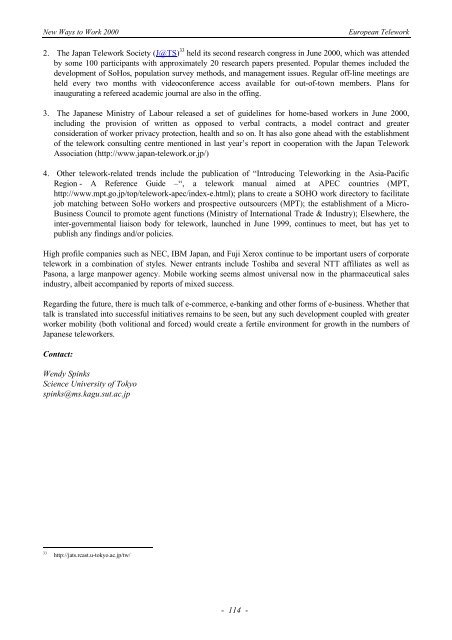eWORK 2000 - European Telework Week
eWORK 2000 - European Telework Week
eWORK 2000 - European Telework Week
- No tags were found...
You also want an ePaper? Increase the reach of your titles
YUMPU automatically turns print PDFs into web optimized ePapers that Google loves.
New Ways to Work <strong>2000</strong><strong>European</strong> <strong>Telework</strong>2. The Japan <strong>Telework</strong> Society (J@TS) 33 held its second research congress in June <strong>2000</strong>, which was attendedby some 100 participants with approximately 20 research papers presented. Popular themes included thedevelopment of SoHos, population survey methods, and management issues. Regular off-line meetings areheld every two months with videoconference access available for out-of-town members. Plans forinaugurating a refereed academic journal are also in the offing.3. The Japanese Ministry of Labour released a set of guidelines for home-based workers in June <strong>2000</strong>,including the provision of written as opposed to verbal contracts, a model contract and greaterconsideration of worker privacy protection, health and so on. It has also gone ahead with the establishmentof the telework consulting centre mentioned in last year’s report in cooperation with the Japan <strong>Telework</strong>Association (http://www.japan-telework.or.jp/)4. Other telework-related trends include the publication of “Introducing <strong>Telework</strong>ing in the Asia-PacificRegion - A Reference Guide –“, a telework manual aimed at APEC countries (MPT,http://www.mpt.go.jp/top/telework-apec/index-e.html); plans to create a SOHO work directory to facilitatejob matching between SoHo workers and prospective outsourcers (MPT); the establishment of a Micro-Business Council to promote agent functions (Ministry of International Trade & Industry); Elsewhere, theinter-governmental liaison body for telework, launched in June 1999, continues to meet, but has yet topublish any findings and/or policies.High profile companies such as NEC, IBM Japan, and Fuji Xerox continue to be important users of corporatetelework in a combination of styles. Newer entrants include Toshiba and several NTT affiliates as well asPasona, a large manpower agency. Mobile working seems almost universal now in the pharmaceutical salesindustry, albeit accompanied by reports of mixed success.Regarding the future, there is much talk of e-commerce, e-banking and other forms of e-business. Whether thattalk is translated into successful initiatives remains to be seen, but any such development coupled with greaterworker mobility (both volitional and forced) would create a fertile environment for growth in the numbers ofJapanese teleworkers.Contact:Wendy SpinksScience University of Tokyospinks@ms.kagu.sut.ac.jp33http://jats.rcast.u-tokyo.ac.jp/tw/- 114 -








